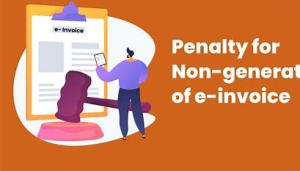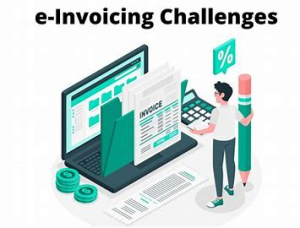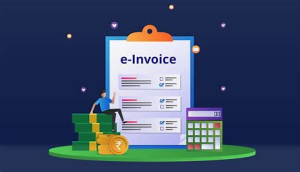E-invoicing has emerged as a pivotal compliance requirement for businesses in India under GST. However, many taxpayers are still unclear regarding the implications of non-compliance. Failing to meet the e-invoice generation thresholds attracts significant penalties and adverse consequences.
This extensive guide details the specific monetary penalties, other legal implications, and potential business impacts for entities defaulting on e-invoicing compliance. Read on to gain clarity regarding the outcomes of threshold non-adherence and make well-informed decisions.
Penalties for non-compliance with the e-invoice threshold
The e-invoicing mandates are governed under Rule 48 of the CGST Rules, 2017. All registered persons with annual aggregate turnover exceeding:
- Rs 20 crore from April 1, 2022
- Rs 10 crore from October 1, 2022
- Rs 5 crore from August 1, 2023
must generate IRN for B2B supplies by reporting invoice details to the Invoice Registration Portal (IRP). Non-compliance attracts significant penalties under Section 122 of the CGST Act, 2017.
Monetary penalties
Two specific monetary penalties can be levied for e-invoicing non-compliance:
- Penalty for not generating an e-invoice: 100% of the tax amount or Rs 10,000 per invoice, whichever is higher.
- Penalty for incorrect e-invoicing particulars: flat Rs 25,000 per invoice
Thus, failure to meet e-invoice generation thresholds by applicable taxpayers leads to heavy financial penalties. The table below summarizes the key monetary repercussions:
| Type of Default | Applicable Penalty |
| E-invoice not generated for B2B supplies | 100% tax amount OR Rs 10,000 per invoice, whichever is higher |
| Errors in the e-invoice schema or format leading to IRN failure | Flat Rs. 25,000 per incorrect invoice |
Consider a business with a turnover above Rs 10 crore that fails to generate IRN for 500 tax invoices of Rs 50,000 each involving 18% GST. This non-compliance will involve paying a penalty of Rs 27.5 lakhs ((500 invoices x Rs 9,000 tax per invoice, i.e., Rs 45 lac tax) or Rs 5 lac (500 invoices x Rs 10,000 per instance)).
Other monetary fines
Additionally, certain other fines can attract attention:
- Detention of goods in transit without an e-invoice: Standard penalties for goods detained as per e-way bill rules
- The penalty payable is 200% of the tax value or 100% of the invoice value, whichever is higher.
- Short payment of taxes arising from suppressed sales on account of non-generated e-invoices
- Interest and penalty of 100% of the tax amount evaded
- Higher penalties based on the frequency of non-compliance
Therefore, the overall monetary burden can be quite substantial if businesses do not comply with e-invoicing generation thresholds.
Also Read: Legal Provisions and Penalties for Incorrect or Fraudulent ITC Claims on E-invoices
Consequences of not generating e-invoices above the threshold

While monetary fines pose a direct burden, certain additional adverse outcomes for businesses make e-invoice non-generation even more detrimental:
-
Disruption of business operations and reputation loss
Failing to generate mandated e-invoices for B2B supplies can lead to the denial of input tax credit to buyers. In many cases, buyers may delay payments or hold back the GST component, citing a lack of valid invoices. Some buyers may even cancel existing contracts and switch to compliant suppliers, creating huge credibility issues. General reputation loss occurs across the ecosystem.
-
Non-auto-population of B2B invoice details in GSTR-1
A key benefit of e-invoicing is the auto-population of B2B invoice details in the supplier’s GSTR-1. This reduces the return filing effort significantly. However, in cases of non-generation, such auto-population does not occur. Suppliers need to manually capture the entire B2B summary, leading to reconciliations between invoices issued and GSTR-1 data and increasing compliance time.
-
Challenges in the transportation of goods
Without an e-invoice, the generation of a valid e-way bill for the movement of goods also gets hindered. Goods in transit without supporting e-invoice or e-way bill documents can be detained for tax evasion concerns. This disrupts supply schedules, order fulfillment, and inventory management.
-
Implications on accounting and tax assessments
If e-invoices are not generated, the underlying transactions remain unreported to tax authorities. This increases tax risks—higher income estimates by the department involving interest liability or penalties during assessments. Sales registers also remain unreconciled without a corresponding e-invoice trail, creating gaps in financial statements.
Clearly, apart from just financial penalties, practical challenges can disrupt operations, commercial relationships, and compliance at large.
Also Read: Reconciliation of Canceled E-invoices: Reporting and Documentation Requirements
Violations and penalties for e-invoicing non-compliance

Two key violations under GST law occur when businesses with turnovers above specified thresholds fail to meet e-invoicing requirements:
-
Non-issuance of invoices
Not registering B2B invoice details on the Invoice Registration Portal for IRN amounts to the non-issuance of the invoice as per Section 31 of Rule 48(4). This violation due to e-invoice non-generation attracts a penalty of 100% of the tax value or Rs 10,000 per instance, whichever is higher.
-
Issuance of incorrect invoices
- Invoices lacking IRN or not as per schema specifications amount to an incorrect document.
- also invites penalties under Section 122.
The table below summarizes the key violations and corresponding leviable fines:
| Types of Non-Compliance | Deemed Violation | Applicable Penalty |
| No e-invoice generation | Non-issuance of an invoice | Higher of 100% tax amount or Rs 10,000 per invoice |
| E-invoice errors and schema issues | Issuance of an incorrect invoice | Flat Rs. 25,000 per invoice |
Therefore, taxpayers must note that non-adherence to e-invoicing, either due to avoidance or inadequate schemas, leads to assumed violations under GST, permitting the levy of steep fines.
If you want to understand the e-way bill system with an easy explanation, then you really need to click on this blog post link by Captainbiz.
E-invoice threshold non-compliance repercussions
The failure to comply with e-invoice generation requirements beyond turnover thresholds has detrimental cascading effects:
-
Immediate fiscal impact
- Significant tax penalties, as detailed earlier
- Interest liability where tax is unpaid or underpaid
- Financial assessment risks
-
Supply chain disruption
- Goods detention if moved without a valid e-invoice
- Delayed stock transfers and order fulfillment
- Commercial losses and payment delays
-
Tax compliance failures
- Gaps/errors in GSTR-1 due to non-auto population
- Mismatches in GSTR-2A/2B of buyers
- Increased scrutiny of financial records as well as GST compliance
-
Stakeholder dissatisfaction and loss of reputation
- Customer irritation due to GST non-compliance
- Vendor rating downgrades
- Trust deficits across the ecosystem network
Clearly, non-adherence can trigger a vicious non-compliance and reputational loss cycle for organizations. It necessitates urgent corrective intervention.
Legal actions for not meeting the e-invoice threshold
E-invoicing non-compliance represents a contravention of specific statutory provisions under GST. It permits the initiation of stringent adjudication proceedings against defaulting taxpayers.
-
Self-admission and rectification
Businesses that have failed to generate mandated e-invoices can choose to voluntarily disclose non-compliance lapses by filing Form GST DRC-03. This form requires furnishing all relevant information—unreported invoices, tax liability arising, etc. The aim is to seek reconciliation opportunities with limited penalty implications rather than harsh actions later. Tax officers review and may issue a final order with interest and a reduced penalty. Overall, it provides a chance to self-correct mistakes before scrutiny.
-
Summons for clarification or interrogation
Where reporting gaps seem evident, like a significant shortfall in returns versus financial statements, tax officers may issue summonses to businesses, asking them to appear and clarify aspects related to e-invoice non-compliance. Various documents may need to be furnished, like sample invoices, ITC documents, annual returns, reconciliation statements, etc., to ascertain the level and scale of default. Officers orally examine authorized personnel to understand the reasons and underlying factors responsible for non-adherence. The scrutiny helps determine any willful misreporting or genuine gaps.
-
Search, seizure, and confusion
In certain cases, the department may conduct surprise verification visits at business premises or warehouses to validate actual stocks when reporting inconsistencies seem prima facie evident. Where unaccounted supply gaps are established, officers can temporarily seize goods, inventory, records, and assets. A further probe is launched if initial findings reveal major irregularities. The disruption caused by such scrutiny and temporary confiscation of assets greatly hurts business operations.
-
Arrests and prosecution
E-invoicing Non-compliance, which forms part of deliberate and large-scale tax evasion efforts, can lead to the arrest of responsible directors, partners, CXOs, etc. They may be taken into custody for further interrogation. In the same vein, prosecution proceedings may be launched in criminal cases depending upon the scale of profiteering and degree of willful suppression unearthed during investigations. These legal actions severely dent brand image.
-
Cancellation of GST registration
In the rarest of cases, for continuous repetitive default in e-invoice generation requirements depicting deliberate mis-declaration of turnover and tax evasion, the tax department deactivates the GST identification number of the concerned business. This greatly curtails the ability to undertake any trade and requires new registration formalities. Moreover, market reputation is adversely affected, which affects stakeholder and customer relationships.
While proceedings get initiated for substantial tax evasion, they indicate the strict view taken for breaching compliance mandates. Legal actions also severely dent brand image and undermine business functionalities.
Penalties for failing to generate e-invoices above the threshold

Considering the assessed outcomes of non-compliance, a summary analysis of key penalties and provisions is presented below:
-
Monetary Penalties
| Default/ Violation | Applicable Fines |
| Non-generation of an e-invoice | Higher of 100% GST or Rs 10,000 per instance |
| E-invoice errors due to invalid particulars | Flat Rs. 25,000 per invoice |
| Short payment of taxes | 100% tax amount + interest |
| Detention of goods in transit | 200% of the tax value or 100% of the invoice value |
-
Adjudication Consequences
- Self-disclosure of lapses via Form GST DRC-03
- Respond to summons and queries by tax officers.
- Risk of search, seizures, arrests, and prosecution
- Striking off from GST registrations
-
Business Impact
- ITC denial and payment delays from buyers
- Contract terminations and relationship disruptions
- Supply chain delays and order management failures
- Higher tax assessments and expanded scrutiny
- General reputation loss amongst stakeholders
Clearly, the non-fulfillment of e-invoicing requirements poses significant compliance, operational, and financial risks, in addition to specific penalties levied on entities.
Conclusion
E-invoicing non-compliance by taxpayers above notified turnover thresholds undeniably attracts stringent monetary penalties and adjudication consequences. Apart from fiscal outgo, it critically hampers business functionalities, commercial engagements, and brand reputation for organizations.
With the latest phase expansion starting on August 1, 2023, nearly 4 lakh registered taxpayers will come under the compliance ambit. For a smooth transition and continued sustenance, understanding and adhering to e-invoicing stipulations is vital. Any accounting or IT limitations must be addressed proactively by seeking expert help. Investing in robust e-invoicing solutions like Clear can ease compliance further.
By comprehending the detailed implications highlighted in this guide around the penalties and outcomes of e-invoice generation failures, businesses across industries can reinforce their GST compliance mechanisms. Proactive preparedness and prudent mitigation steps are vital to avoid the disruptive outcomes of non-adherence. GST compliance aids overall fiscal decision-making as well as enables the sustenance of business operations.
Also Read: E-invoice Threshold in India: Everything You Need to Know
Read this: How India’s digital push is creating vast investment opportunities
FAQs
-
What is the penalty for not generating an e-invoice above the turnover threshold?
The penalty for not generating an e-invoice despite exceeding the specified turnover threshold is 100% of the tax amount or Rs 10,000 per default instance, whichever is higher.
-
Are there any additional fines apart from key penalties for non-compliance?
Yes, taxpayers can face other monetary fines, like:
- Penalties as per the e-way bill rules for goods detained during transit
- 200% interest and penalty for short payment of taxes due to unreported sales
- Higher penalties for repeated defaults
-
What are some problems faced by buyers if suppliers don’t e-invoice?
Key problems faced by buyers include:
- Inability to claim input tax credit timely
- Payments withheld or delayed for lack of valid invoices
- Higher reconciliation efforts between books and GSTR-2A/2B
-
Can e-invoice non-compliance lead to GST registration cancellation?
Yes, significant tax evasion or repetitions of default can lead to adjudication proceedings, including the cancellation of GST registration, which hampers business operations.
-
Does the legal implication differ for errors in e-invoice generation vs. non-generation?
Yes, while non-generation is viewed as non-issuance, errors due to invalid particulars amount to the issuance of incorrect invoices. Accordingly, penalties of 100% tax value (Rs 10,000) and flat Rs 25,000 apply, respectively. Both attract scrutiny for unreported turnover.